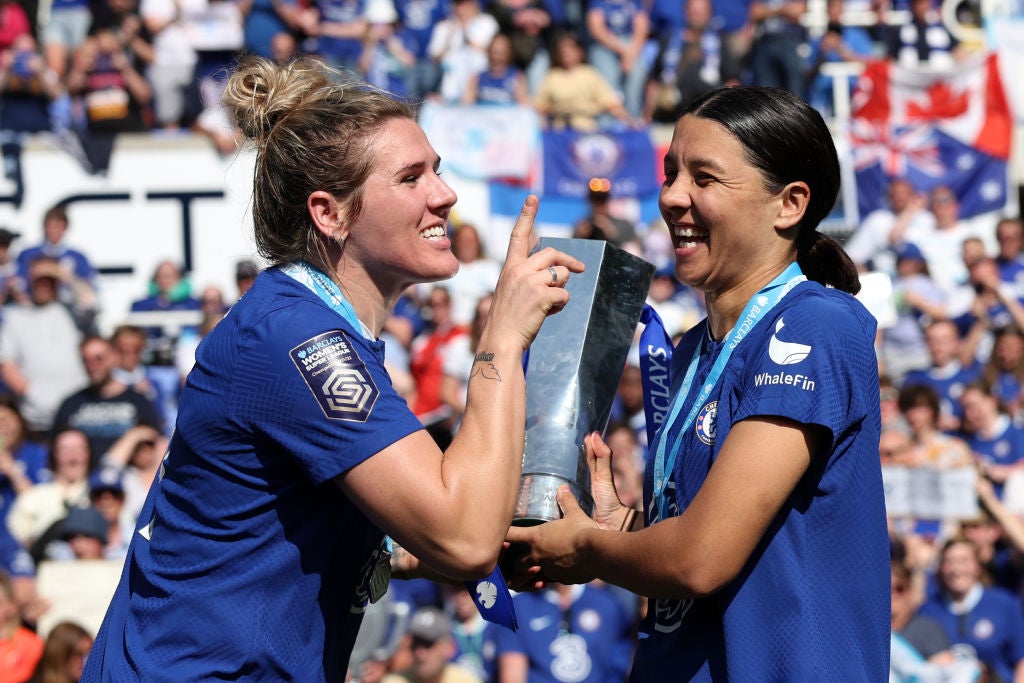Women’s football sees ‘wild’ record transfer spending ahead of new WSL season
Baroness Sue Campbell, the FA director of women’s football, has promised some future limits on spending

As the women’s game in England continues to grow, so do transfer fees with one Women’s Super League manager describing this summer’s window as “wild” following plenty of big spending.
Fifa reported three million US dollars (£2.4m) was spent during the 2023 mid-year transfer window, which was double the amount (£983,000) that women’s clubs outlay across the globe in 2022.
While the spending in women’s football is far behind the sums chucked around in the men’s game, the past 12 months in particular has seen spending rise rapidly as more funds are used following a golden period for the Lionesses.
The success of Sarina Wiegman’s team at the Euros and this summer’s World Cup has contributed towards the WSL going from strength to strength, with clubs from the division involved in eight of the top-10 transfers in the world.
Four of the biggest signings in women’s football occurred this summer with Arsenalreportedly spending more than £300k to sign Australian Kyra Cooney-Cross from Hammarby on transfer deadline day and title rivals Manchester City bringing in Jill Roord from Wolfsburg for a similar amount.
Keira Walsh’s £400k move from City to Barcelona last summer remains the record transfer in women’s football, but Arsenal threatened to break that in January when they launched an ambitious attempt to prize away Alessia Russo from Manchester United.
United stood strong and turned down a bid close to the £500k mark, but forward Russo signed on a free for Arsenal this summer anyway, with the Gunners not content there and adding World Cup star Cooney-Cross into the mix before they conceded defeat in a pursuit of England goalkeeper Mary Earps.
“This has been by far the strongest window for WSL as a league that I have ever experienced,” Arsenal boss Jonas Eidevall said.
Eidevall is not alone in that assessment and, while City were happy just to bring in Roord, the other members of the big four flexed their muscles.
The Red Devils made four signings on transfer deadline day alone, bringing in World Cup golden boot winner Hinata Miyazawa and they shelled out around £250k on Brazil forward Geyse from Barcelona.
Chelsea raided France for Ashley Lawrence and Catarina Macario from Paris St Germain and Lyon respectively.
Meanwhile, forward Mia Fishel signed from Tigres for in excess of £150k to boost a squad full of stars with Emma Hayes’ side eager to take the final step in the Champions League.
Liverpool manager Matt Beard admitted: “You just look at Chelsea’s transfer window and it’s ridiculous. They will have players in there who won’t even be named in their 25-player squad.

“We’re still a way from the top teams in regards to expenditure. You just need to look at the Alessia Russo deal and Arsenal looking to spend another record fee on Mary Earps etc. There is still a big gap.”
It would be inaccurate to state only the big four were spending in the WSL, though after Tottenham showed their ambition - and fear of relegation - when they parted with £250k to sign Bethany England from Chelsea in January.
England immediately flourished, which meant Spurs’ gamble to sign a player for a British record fee paid off after they avoided relegation.
The £250k transfer remains the highest between WSL clubs but the other mid-table teams have enjoyed productive summers with Leicester making Janina Leitzig’s move from Bayern Munich permanent.
Liverpool broke their club record to bring in forward Sophie Roman Haug, while Brighton convinced two-time Champions League winner Pauline Bremer to swap Wolfsburg for the south coast and Everton made several signings after losing Gabby George to Manchester United in a £150k deadline-day deal.
Managerial changes at Tottenham and West Ham saw both make some shrewd additions and newly-promoted Bristol City opted for quantity over quality.
Perhaps the winners of the transfer window were Aston Villa, who purchased Ebony Salmon, Adriana Leon and Netherlands stopper Daphne Van Domselaar alongside keeping Rachel Daly.
However, Villa boss Carla Ward remains perplexed by the numbers being discussed this summer, even if it shows little sign of slowing.
“It’s wild. If you think about a few years ago when players were paying to play and now one transfer of Bethany England going for £250k has inflated everyone’s prices,” Ward explained.
“We need to continue to grow off the pitch and transfer fees have to be in line with that.
“Some of the transfer fees branded around this summer were quite ridiculous. We got offered a crazy amount for one of our players.
“You have gone from your £50k, £60k or £100k bands, to £400k for Keira Walsh which for me is OK because she’s the best midfielder in the world.
“But when you’re talking about £400k or £500k for players not at that level, it’s mind-blowing.”
Baroness Sue Campbell, the FA director of women’s football, promised some future limits on spending.
She said: “The club’s themselves have agreed that we need some cost controls because otherwise, all the money that comes in, ends up getting spent on salaries.
“The women’s game requires a lot more investment in infrastructure, a lot more investment in other things.”
PA



Join our commenting forum
Join thought-provoking conversations, follow other Independent readers and see their replies
0Comments